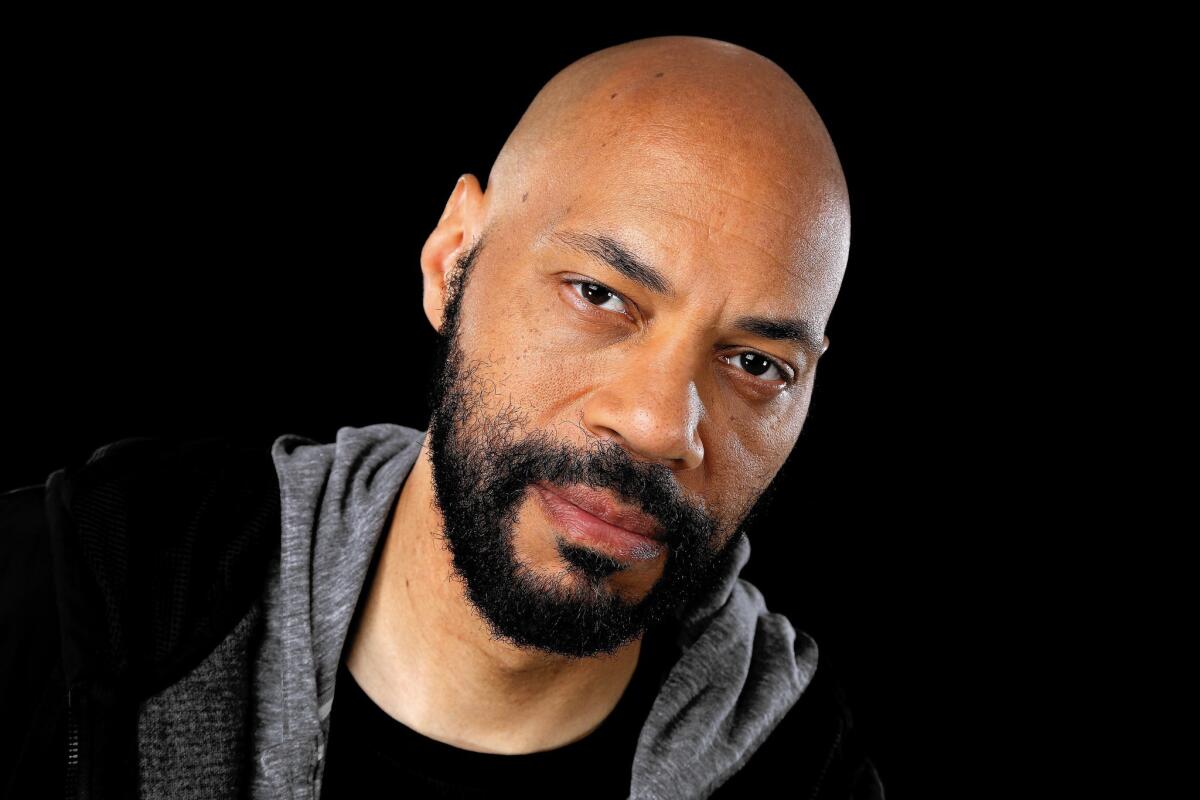John Ridley talks about frank ‘American Crime’ themes and Hollywood diversity

Controversial subject matter — the kind usually reserved for cable dramas — drives ABC’s “American Crime,” the critically lauded anthology series from Oscar winner John Ridley. The second season centers on a male-on-male sexual assault at an elite private school that kicks off a story line tackling racial and socioeconomic issues, sexual identity and disparities in the education system. And last season? The show focused on a racially charged murder and its aftermath.
“It is one thing to write stories that you hope have urgency to them,” said Ridley. “It’s a whole other thing for actors to create characters who are complicated, who are gray, but still give enough so that audience members can be compelled in a way that is very fundamental and is not based on trickery of plot. It’s just based on fundamental aspects of human nature.”
SIGN UP for the free Gold Standard newsletter >>
The drama — which stars Felicity Huffman, Timothy Hutton, André Benjamin and Regina King (who won an Emmy last year for her role in the series) — comes at a time when major broadcasters are showcasing more series that feature lead characters of color. But Ridley, who scored an Academy Award in 2014 for his screenplay for the harrowing drama “12 Years a Slave,” emphasized that the fight for a more reflective Hollywood industry is far from over.
The Times spoke to Ridley about the challenges minorities face in breaking through in Hollywood, and about “American Crime.”
What prompted the storyline for Season 2?
Initially, for [producer] Michael J. McDonald and I, when we had a kernel of belief that we may return, we really looked at what were the perspectives, what were the voices, what were the ideas that maybe we didn’t examine in our first season. We believed we had covered a good deal of territory, but there’s certainly other things going on in America. So, issues of socioeconomics, issues of sexual preference, family — last year, it was so much about families falling apart, and this year, we wanted to see families coming together. Sometimes they are in opposition to one another, but really, in every one of these units, there’s no question in their minds that their sons or daughters are doing the right thing. So when we had those ideas together, we really thought about “OK, what’s the inciting incident?”
And the inciting incident is one that people aren’t accustomed to seeing on the small screen.
One of the things we really wanted to look at was sexual assault. But looking at it over the long term. It’s underreported, under-adjudicated, even professionals don’t often deal with sexual assault in the best way. As we talked to people, as we interviewed people, there was just a lot of stories out there about male peer-to-peer sexual assault that people really could not wrap their heads around. Over the holidays, there was [an alleged] case in Tennessee, one that was frighteningly similar to the one in our show, on a basketball team. It happens and we don’t want to preach about it or try to proselytize about “Here’s how people should deal with it.” But we do want to slow people down a little bit and have them look at what happens in the communities, the families, the individuals when these accusations are made.
This season also gets at the very specific way people view rape — more specifically, the rape of males.
Yeah, Regina’s character says early on that if it had been a girl as the victim, her response may have been different. There’s this belief that guys aren’t going to do that, that it’s not going to happen. And if it happens around young men, well, it couldn’t have possibly happened. For us, it was really about, “What are the stories we want to tell, what are those perspectives, and what is the catalyst, what is it that gets things going? What is it that gets us to look at ourselves as people and our reactions?”
I think unfortunately a lot of times in storytelling, even though it’s coming from the right place, it really does identify women as victims. That these things are going to happen to women in particular. And it certainly does in disproportionate numbers. But I think it’s very important to sometimes say these things can happen to anybody. It can happen anywhere. And our responses have got to be similar no matter where it happens and no matter whom it happens to.
Was there any hesitation or pushback from ABC about this?
It is interesting because when we originally started thinking about this incident, we thought about it being male-female sexual assault. I hope and believe the story would have been potent. And I want to be careful how I say this, because I don’t think there can be enough conversation about sexual assault at all. We had been hearing stories about male-to-male and also peer-to-peer sexual assault, not molestation. And we went to ABC and we pitched it, and there was a moment where they were kind of like, “What?” But to their credit, they were able to see the value in the story.
A lot of times, it’s about challenging the audience. I think there’s a lot of television out there, a lot of television I enjoy — that’s put in front of you and it’s about enjoying it. It’s there, it’s fun, and it’s great. But there’s also moments where you know there’s going to be a fall-off, you know there’s going to be people who watch the first five minutes and then go, “I’m not watching the rest of this” — whether it’s the story, whether it’s the style. But I think the value is that all of those people who do tune in to go, “Wow, this is not what I expected and certainly not on broadcast television.”
You started out in the sitcom world — “Martin,” “The Fresh Prince of Bel-Air,” “The John Larroquette Show.” How did you get to where you’re at now?
Yeah, sometimes people are like, “Why did you end up on sitcoms,” or “Why did you do this or that?” But everything was an opportunity. More than anything, I learned about myself, my strengths, my creative weaknesses. There’s people who took a chance on me for whatever reason. Not because or in spite of the fact that I was a young black man at the time. They embraced the things that I did well, but they allowed me to fail. They forgave me when I failed because they could see the spaces where perhaps I had a little bit better in me. I cannot tell you the things I learned from the show runners who took a chance on me and gave me an opportunity.
How do you feel about this kind of patting-on-the-back we’re seeing in regard to diversity on television? Meanwhile, we see the numbers from SAG or the DGA, and it’s disappointing.
All the numbers across the board, with all the guilds that do the reporting, the numbers among women and people of color are stagnant. One of the things I hope and believe we’ve done well on this show is the majority of [our] directors are women, women of color. We try to be reflective. The people are out there. They’re capable. We willfully keep qualified people from doing jobs where there are jobs. There are 400-and-some scripted shows, meaning there are countless opportunities. There’s no reason and only excuses. This space has been incredibly good to me, but that’s still where we need improve. Doing better is just a notion phrase. We need to do it.
I remember being in the writers room of “Martin,” there were a lot of young people of color. And we really thought and believed that 20 years later, we’d look around and we’d see a whole lot of people that were really contributing. And that didn’t happen. There are days where it’s very, very painful to see. It really is. Things are changing. But again, when you look at the numbers, they are stagnant. In some places, they’ve regressed. We’ve literally gone backward in some areas. I don’t expect every writers room on every set to be reflective. I really don’t. That’s not realistic. But when the majority of them are not even close to being reflective, there is a problem. It’s a stroke-of-a-pen issue at this point. We can make changes overnight. We need to.
And many of the networks have writing programs for minorities — which seems to be the primary way we see minority talent break in. But that’s also problematic.
Right. And that’s how I got in. That still is problematic to me about the entertainment industry. I’m very thankful that people would think of me for “Red Tails” or “12 Years a Slave,” but they wouldn’t necessarily think of me for some kind of straight, middle-of-the-road blockbuster. You certainly see that even more so with female directors — we see it constantly where a female director will put a really interesting film into Sundance or these other festivals, and nothing. And we see it with white dudes — no disrespect to white dudes — where people are handing them money left and right. I’ll be careful how I say this. I’m lucky to be a black man in the business because to be a Latina woman, forget about it. Anybody can go lose $20 million, so why does it have to be a white dude? I’m sure an Asian woman could go blow $20 million with the best of them. It’s not right.
So what advice would you give for those young John Ridleys out there who want to break in but feel it’s impenetrable?
You always have to be realistic, but I think the majority of you has to be unrealistic. Unrealistic to the point where you accomplish something above the space where you didn’t believe. If you asked me, honestly, I never would have thought any of the things that are happening to me really would have happened. But I always believed I would accomplish something. And I always believed that would happen regardless of my race, my age, or where I came from.
------------
‘American Crime’
Where: ABC
When: 10 p.m. Wednesday
Rating: TV-14-DLV (may be unsuitable for children under age 14 with advisories for suggestive dialogue, coarse language and violence)
More to Read
The complete guide to home viewing
Get Screen Gab for everything about the TV shows and streaming movies everyone’s talking about.
You may occasionally receive promotional content from the Los Angeles Times.







